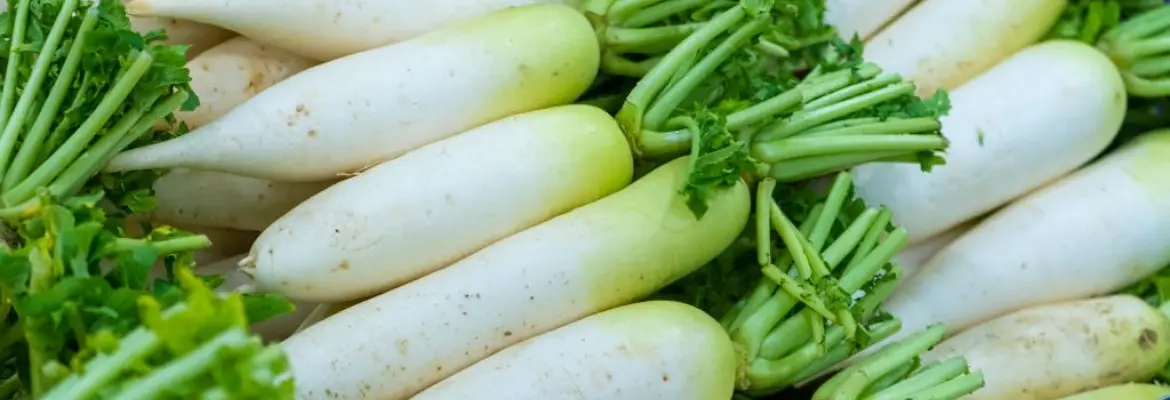Daikon is a mild flavored root vegetable. Daikon is available round the year, however it is considered as a winter vegetable. Daikons have a cylindrical and oblong shape which tapers at the root and the leaf end.
Daikon radish has a white skin, which occasionally will have small hairy protruding roots. Daikon has a crisp, dense and aqueous flesh. The flesh has a slightly sweet and peppery flavor profile. however, when cooked, daikon will loose its crunchy texture ( becomes soft like a potato) and will develop a neutral flavor.
Average length of a daikon ranges between 15-60 cm ( 6-24 inches). Average weight of daikon can range between 450 – 900 grams ( 1 – 2 pounds).
Scientific name of Daikon
Raphanus Sativus
Other names of Daikon
- White Radish
- Icicle Radish
- Mooli
- Muli
- Chinese radish
- Winter radish
- Oriental radish
- Great root
- Japanese radish
- Long White radish
- Asian radish
Nutrition facts of Daikon
*Serving size = 100 grams = 3.55 Ounces = 1/2 cup
*DV= % Daily Value (%DV indicates how much nutrients contribute to a person’s daily diet from a serving of a food. DV assists you in determining whether or not a serving of food is high or low in a particular nutrient.)
| Nutrient | Amount | Unit | DV |
|---|---|---|---|
| Calories | 38 | KCAL | |
| Fat | 2.63 | GRAM | 3% |
| Protein | 0.67 | GRAM | 1% |
| Carbohydrate | 3.3 | GRAM | 1% |
| Fiber | 1.5 | GRAM | 5% |
Calories by source in Daikon:
- Calories by carbohydrate in Daikon = 33%
- Calories by fat in Daikon = 60%
- Calories by protein in Daikon = 7%
Fats and Fatty Acid profile of Daikon:
- Polyunsaturated fat (PUFA) in Daikon = 32%
- Saturated fat (SFA) in Daikon = 30%
- Monounsaturated fat (MUFA) in Daikon = 38%
Detailed vitamin profile of Daikon, vitamin A, vitamin B12, vitamin B6, vitamin C, vitamin D, Folate, Niacin, Thiamin, and Riboflavin is shown in the chart at the end of the article.
Detailed mineral profile of Daikon, Sodium(Na), Calcium(Ca), Copper(Cu), Iron(Fe), Magnesium(Mg), Selenium(Se), Phosphorus(P), Potassium(K) and Zinc(Zn) is shown the chart at the end of the article.
Check freshness in Daikon
- Undamaged and unblemished skin
- Should not be squishy. Should be dense and heavy for its size
- Should have shine and feel slippery to the touch and not sticky
- A heavy diakon signifies that its fresh and plump
- Avoid dry looking daikons
Availability of Daikon
- Generally daikon radishes are available round the year
How to store Daikon
- Whole daikon radish can be stored in refrigerator for 1-2 weeks
- It is advisable to wrap the daikon in paper towel and keep it in plastic bag in refrigerator to see best storage results
- Cooked daikon pieces can be stored in refrigerator for 4-5 days
- Flash frozen daikon pieces can be stored in the freezer for up-to a month
Complete nutrition facts of Daikon
Click on the link HERE to download high quality, high resolution and print ready PDF version of the Daikon nutrition chart/infographic.



